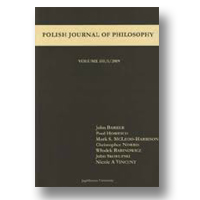|
articles |
|
1.
|
Polish Journal of Philosophy:
Volume >
8 >
Issue: 1
Jack M. C. Kwong
Why Concepts Should Not Be Pluralized or Eliminated
abstract |
view |
rights & permissions
| cited by
Concept Pluralism and Concept Eliminativism are two positions recently proposed in the philosophy and the psychology of concepts. Both of these theories aremotivated by the view that all current theories of concepts are empirically and methodologically inadequate and hold in common the assumption that for any category that can be represented in thought, a person can possess multiple, distinct concepts of it. In this paper, I will challenge these in light of a third theory, Conceptual Atomism, which addresses and dispels the contentious issues. In particular, I contend that Conceptual Atomism, when properly understood, is empirically adequate and can overcome difficulties that plague Pluralism and Eliminativism.
|
|
|
|
|
2.
|
Polish Journal of Philosophy:
Volume >
8 >
Issue: 1
Voin Milevski
The Utilitarian Justification of Prepunishment
abstract |
view |
rights & permissions
| cited by
According to Christopher New, prepunishment is punishment for an offence before the offence is committed. I will first analyze New’s argument, along with theepistemic conditions for practicing prepunishment. I will then deal with an important conceptual objection, according to which prepunishment is not a genuine kind of ‘punishment’. After that, I will consider retributivism and present conclusive reasons for the claim that it cannot justify prepunishment without leading to paradoxical results. I shall then seek to establish that from the utilitarian point of view it is possible to provide a plausible justification of this practice. Finally, I shall attempt to defend the claim that the fact that utilitarianism can justify prepunishment in a satisfactory way is clearly a favourable characteristic of this ethical position.
|
|
|
|
|
3.
|
Polish Journal of Philosophy:
Volume >
8 >
Issue: 1
Olga Poller
Formal Representation of Proper Names in Accordance with a Descriptive Theory of Reference
abstract |
view |
rights & permissions
| cited by
In this paper I present a way of formally representing proper names in accordance with a description theory of reference–fixing and show that such arepresentation makes it possible to retain the claim about the rigidity of proper names and is not vulnerable to Kripke’s modal objection.
|
|
|
|
|
4.
|
Polish Journal of Philosophy:
Volume >
8 >
Issue: 1
Robert J. Rovetto
Presentism and the Problem of Singular Propositions about Non-Present Objects – Limitations of a Proposed Solution
abstract |
view |
rights & permissions
| cited by
In “A Defense of Presentism,” Ned Markosian addresses the problem of singular propositions about non-present objects. The proposed solution uses aparaphrasing strategy that differentiates between two kinds of meaning in declarative sentences, and also distinguishes between two truth-conditions for singularpropositions. The solution, however, is unsatisfactory. I demonstrate that both truth-conditions suffer from the same problems in spite of the examples used to support the claim that one is a proper treatment for singular propositions. Part of the difficulty is in the limited expressivity of logical formalisms, a limitation not unique to the philosophy of time, but one which calls for greater attention.
|
|
|
|
|
5.
|
Polish Journal of Philosophy:
Volume >
8 >
Issue: 1
David Sackris
It Might Not Be All That Cloudy
abstract |
view |
rights & permissions
| cited by
Kai von Fintel and Anthony Gillies have proposed a revised contextual analysis of sentences that make use of “might” epistemically. On their view, when aspeaker uses an epistemic modal term, several propositions are made available to his conversational partners and, as a result, there are several propositions that may be picked up on by those partners. Because there is no concrete “context of utterance,” there is no one proposition that the speaker could be said to have asserted. This is meant to resolve conflicting truth evaluations by different speakers of a single utterance. I argue that the position is unworkable for two reasons: First, on their view there is no single proposition that counts as being asserted or semantically expressed by a “might” utterance; this has several counterintuitive consequences. Second, their position does not address several of the original problems that led many to abandon a contextual account.
|
|
|
|
|
6.
|
Polish Journal of Philosophy:
Volume >
8 >
Issue: 1
Michael Shaffer
The Paradox of Knowability and Factivity
view |
rights & permissions
| cited by
|
|
|
|
|
book reviews |
|
7.
|
Polish Journal of Philosophy:
Volume >
8 >
Issue: 1
Adam C. Podlaskowski
John MacFarlane, Assessment Sensitivity: Relative Truth and its Applications
view |
rights & permissions
| cited by
|
|
|
|
|
8.
|
Polish Journal of Philosophy:
Volume >
8 >
Issue: 1
Krzysztof Posłajko
Douglas Edwards. Properties
view |
rights & permissions
| cited by
|
|
|
|
